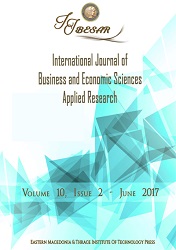Knowledge as an Object of Transfer Cooperation between Enterprises Foreign and Domestic
Knowledge as an Object of Transfer Cooperation between Enterprises Foreign and Domestic
Author(s): Magdalena Byczkowska, Anna MajzelSubject(s): Business Economy / Management, International relations/trade, Financial Markets
Published by: Τεχνολογικό Εκπαιδευτικό Ίδρυμα Ανατολικής Μακεδονίας και Θράκης
Keywords: knowledge; foreign direct investments;
Summary/Abstract: Purpose: The aim of the considerations undertaken in this article was to identify the issues concerning the scope and effects of cooperation between companies with foreign capital and domestic entities of foreign direct investment and to identify the scale of impact of foreign companies operating in Poland on domestic entities in the sphere of knowledge. Design/methodology/approach: The main survey was conducted in 2017 and covered a group of 120 foreign enterprises from the list of the largest foreign investors in Poland, drawn up by Polish Information and Foreign Investment Agency (PAIiIZ). As part of the conducted survey, a targeted selection was applied, which guaranteed a selection corresponding to specific survey criteria. The measurement tool was a survey questionnaire, which contained both open and closed questions. In the case of the majority of closed questions, it was possible to add own answers to the proposed variants, not provided by the Author. Findings: By penetrating domestic economies, they bring not only such an important capital, but a whole package of added values, which are worth mentioning, among others: knowledge, managerial skills or an increase in the level of innovativeness of enterprises. The importance of foreign direct investment, as one of the most important factors in the modernisation of the domestic economy, is all the greater the scarcity of domestic financial resources prevents actions to improve the country's competitiveness, but also when it is not possible to create innovations on one's own. An opportunity to bridge the gap in economic development (including the technology gap) of less developed or developing countries is precisely the activity of international companies, which are a form of foreign direct investment. This is because they bring with them the transfer of technology and knowledge, which are stimuli for innovation and development of the modern economy. Research limitations/implications: One of the most basic and uncontrolled constraints is the limited access to data related to the survey - (data protection by enterprises), - original sample selection - The group of investors was selected by comparing the list of the Polish Information and Foreign Investment Agency (PAIiIZ) - the 500 largest foreign investors in Poland, and the list of "Fortune" magazine - the 500 largest corporations in the world classified by value of income. Apart from direct impact on the economy of a given country, foreign investment may also have an indirect impact (portfolio investment) - the method of quantification of data collected by financial institutions has often made it impossible to distinguish between these two streams of foreign capital. Originality/value: The study carried out by the author of the dissertation is in itself a significant contribution to the development of FDI methodology in Central and Eastern Europe. The most significant results representing the scientific novelty of the dissertation include the following elements: determining the impact of FDI on the formation of business systems related to the broadly understood knowledge and skills of the company - including the management and organization system, quality management, and employment.
Journal: International Journal of Business and Economic Sciences Applied Research (IJBESAR)
- Issue Year: 13/2020
- Issue No: 1
- Page Range: 52-60
- Page Count: 9
- Language: English

